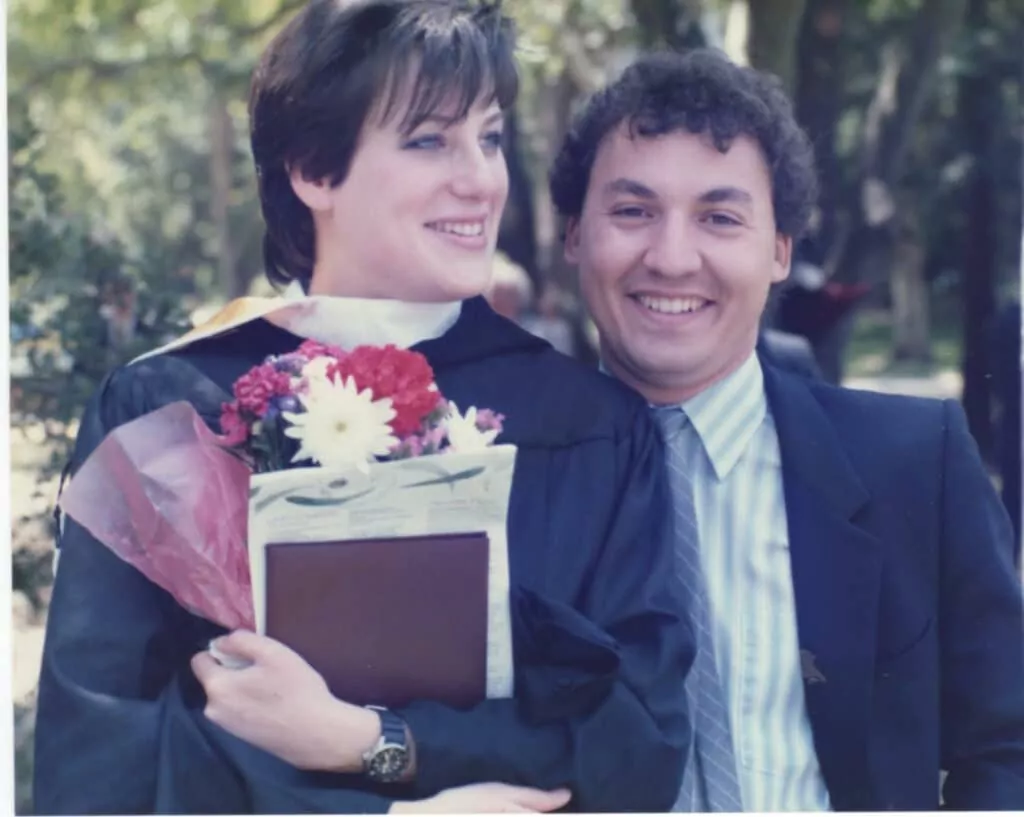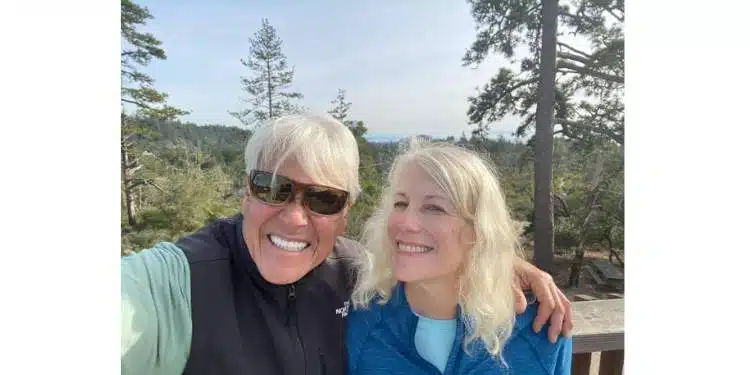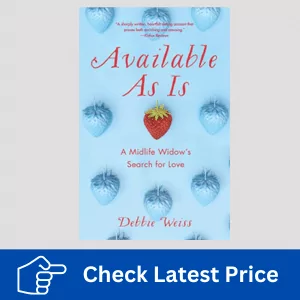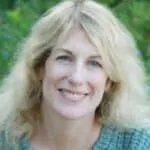by Debbie Weiss
Life After Loss
I will always regret that my final words to my dying husband, George, were,
“What’s your damned Wells Fargo password?”
The son of family friends, I met George when I was seven and he was an older man of eleven. We started dating in 1981 when I was a high school senior who needed a date to the prom. A college senior majoring in engineering at U.C. Berkeley, he graciously agreed to accompany me.
We spent 32 years together until he died of cancer in 2013 at age 53. During our marriage, George and I lived an isolated existence with no kids and few friends. We spent almost all our free time together, just the two of us. A software engineer, he was happiest at his computer. A retired attorney and an introvert, what I most enjoyed was curling up with a book. Even during the week, we ate dinner together every night.
He was my life, my one and only. Without him, I was lost.

Learning to Take Care of Myself
When George went into the hospital for what turned out to be the final time, I went through our bills that were neglected during his health crisis. I quickly realized I didn’t have his passwords so I couldn’t pay them. He always took care of the finances. Hence my last words to him at the hospital, not knowing he would never return home, and this would be our final conversation.
George was in charge of more than just the finances during our marriage. He had a strong personality and wanted things done a certain way. His home theatre system was so complicated I needed him to watch a movie. George did the cooking and enjoyed cooking complex recipes, so we often spent our weekends tracking down rare ingredients. Our moldy shower leaked into the dining room because we could never agree on a bathroom remodel. He wanted cutting edge while I wanted simple and reasonably priced.
Once George passed, I realized I needed to learn to take care of myself. I channeled my grief into manic energy, starting with figuring out the finances. From there, I worked at making our house feel like my home, rescuing the dining room from drowning and replacing his electronics with electronics easier for me to use.
But even with order restored, my life felt empty without George.
Building a New Life
At first, I returned to the interests I had before George got sick. I resumed my daily walks, joined a yoga studio, planned some trips and re-enrolled in my weekly writing class. But it wasn’t enough; I knew I had to start reaching out to others or else reconcile myself to a very lonely life.
To meet new people, I joined a few organizations like my local synagogue and Rotary Club. Over time, my interests expanded. My walks turned into hiking on the weekends with groups I found on meetup, which filled the days I missed George the most. I found a tribe of girlfriends through the yoga studio, many of them single, who invited me into their weekly drinks nights and yoga retreats.
I also decided to travel, something George never wanted to do. With no one to go with, I went on group trips organized by my college alumni association. I discovered I missed George less in places we didn’t go together and therefore didn’t feel his absence by my side.
Finally, my writing hobby grew to include workshops and a weekly writing group of people who became good friends. With their encouragement, I began submitting essays and seeing my work in online magazines. I even got to teach a few writing classes. Later, I decided to write a book sharing my experiences relating to creating a new life after widowhood. To fulfill my dream of becoming a published author, I enrolled in a Masters of Fine Arts (MFA) program in creative writing. I published my first book, Available As Is: A Midlife Widow’s Search for Love last September.
Finding My Voice
George made most of the decisions during our marriage from where we lived to how we spent our time. Perhaps this was because George was four years my senior and I was so young when we got together. Or maybe it was because he was so strong-willed. Happy to be enveloped in a loving relationship, I gave little thought to what I might be missing. Later, my passivity became a habit, not wanting to cause disagreement or take time away from “us.” So, I didn’t push for the things that I enjoyed, like lingering in cafes or going to the beach.
After being on my own, I would never again relinquish my agency. I learned the hard way how important it is to understand the finances, know how to handle the home repairs, etc. And I found joy in pursuing my own interests. If I were still married, I never would have hiked on the weekends or taken my writing so seriously. But finding my voice saved me during many bad times during the years I spent alone.
Love Looks Different the Second Time Around
I started dating fourteen months after losing George at age 50. So much was different from when I last dated in 1980 as a high school junior. Not only was chivalry dead, but it seemed that basic courtesy was gone as well. I experienced men making last minute requests to meet and even more last-minute cancellations, refusals to meet halfway, and pushy requests to become physical.
After five years and almost giving up hope, I found my second love online. My first date with Randal lasted twelve hours, starting with a drive down the coastline and ending with dinner at a restaurant on the water. I knew he was the one when he told me he read everything I wrote in my profile to learn more about me.
Soon after we started dating, I left for a three-week group tour through Eastern Europe I planned before we met. But he was waiting for me when I got back, and he loved that I had my own interests.
This May marks five years together. Two years ago, we moved to a new home by the water. It was a place I loved, and we decided on together. I sold the house of 27 years where I lived with George, finally getting rid of the last of his cookbooks and other things that no longer fit. I lived too long in the shadow of his memory.

Live Your Best Life Now
I will always love and miss my George. However, these past five years were the happiest of my life. This time, Randal and I both have the passwords and if we disagree, I’m often the final say. But my best advice is to start finding your voice now. Don’t wait. Live authentically, cultivate your own interests and find your joy. Don’t be afraid to step outside your comfort zone. Know that your thoughts and feelings matter. Most importantly, get to know yourself without judgement. You don’t need a catastrophic loss to show you how finite this life can be.
About the Author: Debbie Weiss
Debbie Weiss is a former lawyer and the author of Available as Is: A Midlife Widow’s Search for Love. Read more about it on debbieweissauthor.com. Her writing has been published in The New York Times “Modern Love” column, Huff Post, Woman’s Day, and Reader’s Digest among other publications. A longtime resident of the California Bay Area, she lives in Benicia, California.
A Few Notes About Finding Love Again
It’s definitely possible to experience love again after the death of a spouse, though grief and loss are deeply personal experiences. The journey to healing and finding love again can be different for each individual. Here are a few things to consider, contributed by the publisher.
Grieving and Healing First: It’s important to give yourself time to grieve and heal before seeking a new romantic relationship. Rushing into a new relationship too soon might not provide the emotional space needed to process your feelings and memories.
Different Forms of Love: Love is multifaceted, and while a new romantic love might come into your life, it doesn’t diminish the love you had for your deceased spouse. Love can take on various forms, including friendships, family relationships, and even self-love.
Emotional Readiness: Assess your emotional readiness for a new relationship. Ask yourself whether you feel open and ready to connect with someone on a deeper level without feeling guilty or conflicted about moving forward.
Communication: If you do decide to explore a new romantic relationship, it’s important to communicate openly with your potential partner about your past and your feelings. Transparency about your history can help build trust and understanding.
Honoring Memories: Entering a new relationship doesn’t mean you have to forget your late spouse. It’s possible to honor their memory while also embracing the possibility of a new connection.
Taking it Slow: Give yourself permission to take things slowly. Don’t feel pressured to jump into a serious relationship right away. Take the time to get to know the person and ensure that your emotional needs are being met.
Support Network: Lean on your support network—friends, family, or support groups—as you navigate this new chapter in your life. They can provide valuable insights and perspectives.
Self-Care: Continue to prioritize self-care and emotional well-being. Engage in activities that bring you joy, foster personal growth, and help you maintain a strong sense of self.
Seek Professional Guidance: If you’re unsure about your feelings or have concerns about entering a new relationship, consider seeking guidance from a therapist or counselor who can help you navigate your emotions and choices.
Everyone’s journey is unique. Some people may find love again relatively soon after losing a spouse, while others may take more time. The most important thing is to listen to your own emotions, be true to yourself, and make decisions that align with your values and desires.












